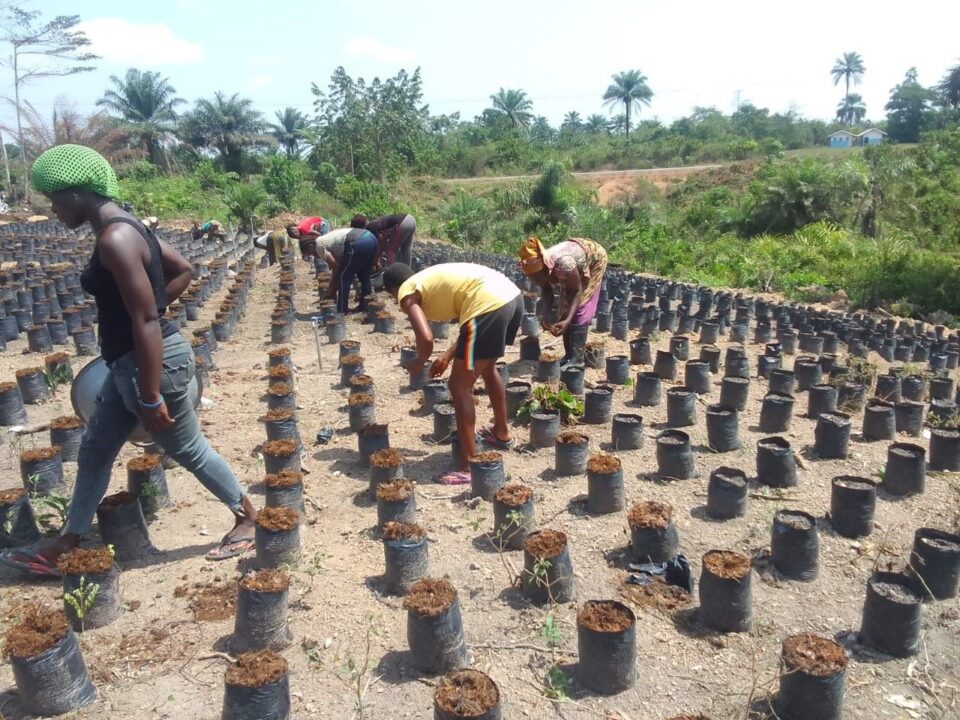Catherine Dahn, a palm farmer for about three years experienced significant losses before learning the new techniques of palm cultivation.
She said that a drum of boiled palm nuts whose production involved lots of hard labor, several hours of pounding using her hands, coupled with the extreme heat that oozed from the boiling palm nuts and the blazing fire, in the time passed would give her just one tan of the 20-liters oil plus two gallons.
Since the Community Empowerment and Innovation in Agriculture Cooperative Society (CEIACS) introduced the new climate-smart nursery approach and the supplies of a new breed of palm seedlings, a drum of palm nuts now produces four tans of 20 liters of red palm oil, three times more than what she produced in time past.
Climate change is increasingly affecting Liberian farmers, hitting both vegetable and palm growers hard. Oil palm, a major cash crop, covers around 1 million hectares in Liberia and supports about 21.2 percent of farming households. The lack of education and the necessary tools to help these farmers adapt and make their palm farming sustainable, before the support of (CEIACS) these farmers were benefiting from palm farming.
“At first, it was tough,” Catherine Dahn said. She went on saying “For me to take care of my palms it was not an easy thing, because the groundhog would eat all up and the sun would damage almost all the palm nursery. But since I got the knowledge, my palms have been growing well and I am making good money now.” Catherine said with a smile.
The UN Food System Hub reports that agriculture contributes about 36 percent to Liberia’s GDP. Oil palm is a key crop for farmers, providing a significant source of income. It covers over 1 million hectares of Liberia’s land.
Since the Community Empowerment and Innovation in Agriculture Cooperative Society began training over 200 local farmers in Gbehlay Geh, Nimba County, in sustainable palm cultivation, these palm farmers have reported a significant boost in their yields and incomes.
Eva Gweh, another farmer, said that without learning about sustainable palm farming techniques to adapt to climate change, they would have struggled to overcome the substantial losses caused by the shifting climate. She credits the local organization for introducing them to these innovative nursery and cultivation methods.
“I used to call myself a palm farmer, but in real life, I did not know about palms,” Eva reflected as saying.
She continued, “We were just carrying palms here and there, and whenever we planted, they did not turn out good, but since they put this group together, it has made us advance in our farming system.”
In Liberia, most of the poorest people live in rural areas, where agriculture is their primary source of income. According to the Food and Agriculture Organization (FAO), over 60 percent of the population relies on agriculture, but their lack of opportunities to adapt to climate change and engage in sustainable agriculture has remained a big challenge.
Climate change is already coming with higher temperatures, changes in weather patterns, rising sea levels, and more frequent extreme weather events. Experts have warned that if nothing is done to help Liberian farmers adjust to the growing impacts of climate change, it would pose a huge risk to Liberia’s food system.
Liberia’s palm farmers play a crucial role in the country’s food security. Red palm oil is a staple in the diet of most Liberians and is also exported to the Netherlands, India, Morocco, and Côte d’Ivoire, according to the Observatory of Economic Complexity (OEC).
In 2022, Liberia exported $90.8 million worth of palm oil, ranking it as the 29th largest exporter of palm oil globally.
According to an executive from the Community Empowerment and Innovation in Agriculture Cooperative Society, Zlanpea Teah Liberian palm farmers play a crucial role in all of this.
“Palm farmers in Liberian are very important to Liberia’s agriculture sector. They can be a big driver to contribute to the country economically and contribute to Liberia’s food system, but they need lots of support to help them do sustainable farming.”
This, Teah told this paper, prompted his group to begin working with the farmers in Gbehlay Geh with the new palm farming nursery and planning methods.
“They (farmers) are now harvesting from their farms very successfully. We get palms from Malaysia and the Malaysian super breeds which we taught them how to put on nursery are very good and they produce more oil,” Teah said.
The new palm cultivation methods have not only enhanced farmers’ knowledge but also boosted their palm oil production.
The United Nations Development Program has highlighted significant international market opportunities for Liberia’s palm oil and related products. However, agriculture experts and climate justice activists stress the importance of supporting Liberian farmers by helping them adopt climate-smart practices and providing the necessary tools and materials. This support could be transformative in helping them cope with the ongoing impacts of climate change. This story is produced by FeJAL Mentorship Fellow, through the support of Internews Year 3 Media Activity Reporting Program.

